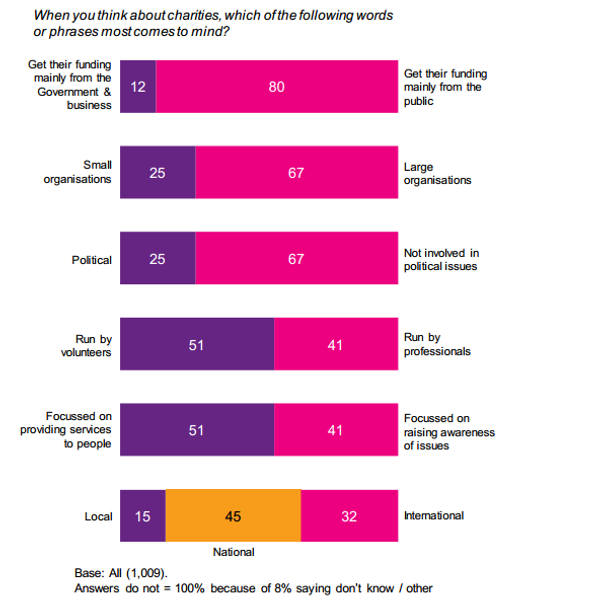Sue Wixley, co-author and director of communications at New Philanthropy Capital suggests the public would have a clearer idea about the role charities play in society if trustees explained the principles behind the organisation, and offered greater transparency on the decisions they make: "There have been quite a lot negative headlines about charities, about how much CEOs are paid, and politicians have been stirring things up. Charities have not stood up and responded and we think they need to do that and perhaps explain what they do, and why they do it."
Rosie Oliver, policy officer at ACEVO, an organisation which represents charity leaders, says charities don't just help the vulnerable, they represent them.
"They give a voice to the voiceless.We need to be able to trust charities so we can discharge this absolutely essential duty to people feel they have a voice to speak to them that they can rely on."
The key findings in a previous report ‘Matter of trust' published by the NPC suggests that one-in-three people have doubts about charities and that people are more wary if they think a charity has an international agenda (27%), versus those who see charities as being national or local organisations (21%).
The most mistrust derives from people who think charities receive their funding from government and businesses (55%), and those who think they have a political agenda (47%).

However according to Rosie Oliver, policy officer at ACEVO, the lines are becoming blurred in the media about the difference between being political and being partisan.
"Charities being partisan is not allowed, they're not allowed to have political affiliations but a campaign being political is not a bad thing. Certainly for larger ones, especially the ones who want to engage with the political process that affect their beneficiaries and to bring about change not through shouting in the corner of the room but though working with the people who can make a difference".
The Foundation for Social Improvement is an umbrella organisation for small charities which offers courses and advice to its members. Chief Executive Pauline Broomehead agrees that it's more important to influence a particular political decision before it is made.
"We are trying to influence change which is better than trying to change what's happened. Trust matters because charities are the custodian of so many people's hopes, and values. We all hope that one day we don't need one but we're grateful they're there for other people who do."
As for the future of the third sector in Britain, Pauline Broomehead believes charities should be encouraged to develop a mixed income economy.
"What is their Intellectual Property? Are they using their building efficiently? If they have a mission to get people into work, why not set up a temping agency where they would get money from companies by placing young people in work so that they're meeting their mission to move people into employment. Ensuring we have funds to deliver our goal is our fundamental mission".
Charities rely on the public to put their hands in their pockets, to donate online or sign up to a good cause on the street. Sue Wixley at New Philanthropy Capita says that if the public are informed about why charities use these different techniques it will help improve public trust.
"Techniques for fundraising are all questions worth discussing with the public and if that happens trust will improve".
Rosie Oliver, policy officer at ACEVO says the Third Sector must be transparent: "Charities and the Third Sector need to be open and prepared to talk about why pay is what it is, and justify what they're doing. Charites have always worked on behalf of beneficiaries and we need to make sure we know that's not going to change but the infrastructure needs to be in place to do that".
It seems the charities that have been championing the voices of the voiceless have been too silent themselves.
The Charity Commission has requested that all registered charities include in their annual report for 2015 how much income or grants they receive from central or local government contracts, whether the charity has a policy on paying its staff and if it reviewed financial controls during the annual reporting period.
Paula Sussex, Chief Executive of the Charity Commission says the public should expect charities to be accountable and transparent: "They also expect us to regulate effectively and to use the tools at our disposal to do so. This additional information will help achieve both aims. I hope it will also encourage trustees to monitor their charity's financial controls and carefully consider what they pay their staff".


